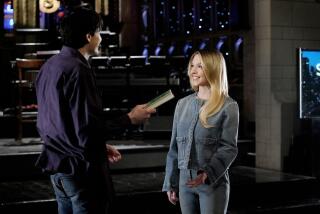Strike Reflections: A Pyrrhic Victory for the Odd Men Out
Shortly after the vote to end the writer’s strike came through last Sunday, I drove up to a friend’s house in Beverly Hills to wish him well on an upcoming trip and chat about the life of the writer in Hollywood. Just before leaving home, I caught a couple of live TV reports on the vote and some interviews, the general tone of which expressed “cautious optimism about the future” and a certain pride in how well the writers had expressed solidarity with each other (not quite true) and how they could now look forward to being treated with “respect” (that word came up more than once).
What should have been a moment of jubilation in those interviews, of the tears of joy that attend the moment of hard-won reconciliation, seemed curiously empty and askew, like the feeling that follows the declaration of a mistrial.
One can understand that the writers had just come through a war of attrition, and as one of their representatives said, “In a war, everybody loses.” But there was a grimness that had seeped like marsh gas into the proceedings from the first, when it became tacitly understood that the dispute between the Writers Guild of America and the Alliance of Motion Picture and Television Producers was like a lover’s quarrel where the argument is ostensibly about one thing but in reality is about something else.
There’s no questioning the validity of the issues--”creative control” and foreign and domestic residuals--but at bottom there was something else that for me came into focus weeks ago when a striker told me of walking the line and picking up a handbill that read, in effect, “We reserve the right to write our own trash. We don’t want anybody else writing it for us.”
He asked, shaking his head sadly, “Can you imagine the self-loathing implicit in that phrase?”
That had caught it for me. This strike wasn’t just about money and control. It was about the writer’s self-worth, an enviably rare achievement in the old Hollywood that has become infinitely more unattainable in the new. And on a larger scale, it was about the industry’s tacit but fairly thorough abandonment of any pretense towards offering cultural nutrition to America--or the world, for that matter.
I drove west on the Santa Monica Freeway and got off at National Boulevard, turning north for Benedict Canyon. It was a clear day, and the growing shadows of early dusk threw the landscape into cozier and more sumptuous relief as I made what seemed a symbolic ascent from the plainly nondescript single family dwellings near the freeway to the magnificent semi-secluded homes in the hills, so beautiful that you could make a full-time job out of living in one of them. These were the architectural tributes to the reality of the Hollywood myth. I wondered if any writers could afford them.
My friend is a veteran performer who writes screenplays when his career hits a down cycle in the normal ebb and surge of any working show-biz life. He looked grim.
“The writers are considered less than nothing in the pecking order,” he said. “(Alliance spokesman) Herb Steinberg said on Bill Moran’s KFI show, ‘I don’t know what the writers want.’ Didn’t they supply a list of demands?,” my friend said, ironically. “Nobody raised an eyebrow when (entertainment lawyer) Ken Ziffren told the assembled guild and producers, ‘Sometimes you’ve gotta rise above your principles.’
“Herb Sargent (an Emmy Award-winning script editor for NBC’s “Saturday Night Live” and seasoned pro) came out from New York to help mediate. ‘Now I know why I don’t live here,’ he told me. ‘All the talk is about money. Nothing about the spirit.’ ”
Speaking of the producers’ contention, ‘We don’t see any point in meeting with the writers again, ever.’ ” a stance considered peculiar at best for any sincere labor negotiation, my friend said, “There’s a feeling that they’re trying to break the union, which may not be such a difficult thing. This isn’t the International Workers of the World we’re talking here, or John L. Lewis and the United Mine Workers. This town is characterized by a lot of jealousy, envy and spite.
“Nothing gladdens people’s hearts more than the failure of their friends. It isn’t about what you are here, or your work. It’s about where you live, where you eat, and what you drive.”
The writer in Hollywood has always been an odd duck, from the days when talkies first came in and alarmed studio officials realized that somebody was going to have to put words in the mouths of their swooning matinee idols. The call went East to Broadway playwrights and famous novelists to come out and put their talents to celluloid.
A certain reciprocal suspicion, if not downright disdain, developed between movie-makers who considered the Eastern crowd snooty and effete, and the literati who looked on Hollywood as the apotheosis of glitzy vulgarity.
“My image of Hollywood,” Dorothy Parker once remarked, “is of a block-long limo with a gloved, jewelled hand sticking out the rear window holding a bagel with one bite taken out of it.”
Though regional barriers have come down somewhat in the interim, the sense of the writer as anomaly persists. If an early precedent was set where moviemakers had to adapt what were essentially literary and theatrical sensibilities to the specific demands of movies (and later, television), the writer has been treated somewhat like Mama’s kitchen helper, doing his or her share to set the table for the dinner party before being scooted upstairs.
“We were mistrusted,” said a writer who is now a successful writer-producer at Universal. (Many people I spoke with about the strike didn’t want to be identified in print. One even said to me “I wish you wouldn’t write an observational piece. The greatest disservice one can do now is to generalize. The wounds are still too fresh.”)
“I came to Hollywood in 1950,” this man said. “At that time, we weren’t allowed to park in the studio lot. We could go to previews of our movies, but not the premieres. We never got the parties, the champagne. Over the years, as television matured and the industry became more like Wall Street, it became clear that a producer had to know how to write because of the tighter deadlines. TV quickly became a writer-producer’s medium. The writer per se has always been odd man out.”
“Once he crosses over,” said another writer-producer in films and TV at Paramount, “a certain mind-set takes over. Inevitably he becomes part of management once he begins participating in the profits. It’s not always such a bad thing. Billy Wilder was a writer before he became a director. And what would’ve become of Herman Mankiewicz’s ‘Citizen Kane’ if he hadn’t had the collaborator he did?
“Now that the writer-producer has taken up the slack after the collapse of the star system, the situation has become more complex than it used to be,” he went on. “A Stallone can refuse to sell a script unless he stars in it. The Writers Guild has a much more complex constituency. You have episodic TV writers, screenwriters, movie-of-the-week writers, long-form TV writers, some of whom look down their noses at others. It’s difficult to approach the membership as a whole. It’s become a polyglot.
“This strike was especially bitter because acrimony tends to be more severe between people who’re alike than between people who’re strangers, and because, for the first time, the face of management came into such sharp focus. To read that Disney’s Michael Eisner makes over $30 million a year--that keeps people up nights.”
“In the past, we dealt with primitive types, wild men,” said the Universal writer-producer. “But they were our own. They may be out to kill you at the negotiating table, but we all went out for dinner together afterwards. We were, roughly speaking, colleagues. Now it’s the new management, the studios and networks owned by Coca-Cola, Gulf & Western, General Electric. They really play hardball.
“The lawyers and CPA’s who man the industry towers now tend to look askance at writers. And I’m not so sure they’re not right at this point. I feel bitter about the Coalition group (a band of dissenters who wanted to go back to work without a contract). Four years ago we (the Writers Guild) rolled over and played dead over the issue of cassette royalties, where there was $3 or $4 billion at stake.
“But that was when we were in the Reagan world. Now we have a group of people with no sense of history, who think the world began on the day they were born. They formed to say, ‘We don’t trust the union. We get paid because we’re smart. We trust management.’ They don’t realize that whatever strength we have is based on what was fought for 20 years ago, and 20 years down the line writers will benefit from the battle we wage today.
“Management ran a tremendous bluff by us four years ago, and they did it again,” he said. The pain and anger in in his voice was clear. “They started to feel the panic of having no season and they put the heat on us. And we folded. We were beat. We were torpedoed. Don’t get me wrong. I feel for the agony of the writers who face losing their homes and can’t feed their families. But if we’d just held on a little longer we could’ve won something real. Instead we rushed to get the deal we could’ve had 20 weeks ago.”
I’m not exactly a full-time veteran Hollywood observer, but aside from reading and talking to industry professionals, I can perceive what changes have occurred in Hollywood simply by looking at old movies and contrasting them with new movies (the same with television). I don’t think, for example, that a movie like “The Bad and the Beautiful” could be made today because we seem to have lost the self-protective sense of irony of people who can recognize the sweets and poisons of corruption--even as they’re swept up in it. Nobody today anxiously refers to television as “the boob tube,” or openly speculates on the medium as a “wasteland,” as was the case 30 years ago. There’s no contemporary Dwight MacDonald to pillory “masscult.” We’ve lost that sense of cultural distinction.
I didn’t laugh, as much of the rest of the theater audience did, when in “You Oughtta Be in Pictures,” Neil Simon alluded to a “teen-age studio president.” For me, that was almost too close to being true. As a former college basketball player, last year I was invited to coach a team of young studio execs in a west Los Angeles recreation league, and in a pre-game warm-up overheard two of them discuss “scoping the girls” at Helena’s like earnest adolescents.
If at one point after World War II and the Korean War some of our best minds worried aloud about the manipulative encroachments of a new American Corporate state into our private lives, we always saw in the life and work of the artist a corrective against the debasement of conformity. The artist stood for individuality, for freedom, for imagination, for true Prospero-like self-recognition, for creative inquiry into the darkness and silence that surrounds us.
Now the most revolutionary and far-reaching media of the 20th Century, television and the movies, are increasingly owned by corporations through whose mass-marketing efforts we begin to lose our sense of diversity. We become defined by what we consume.
It may not be altogether true, in movies and television, that “in the beginning was the Word.” They are, after all, visual media. But the writer does shape a conception and the depiction of experience, most of the time in an uncertain solitude. He or she is always there at or near the beginning.
There always has to be a terrible pain at seeing one’s work picked over and rummaged through and maybe snatched away altogether by a producer, a director, an agent, a star. Or a rewrite man.
That pain eventually translates into self-doubt, into fear. If Hollywood has an eye for beauty and knows how to exploit it, it has a nose for fear and knows how to exploit that too. Now I understand why another screenwriter friend who has sold a number of scripts, all unproduced, likes to tell me about the money he makes but has never offered to show me any of his work.
Not all the writers in the guild are necessarily good writers (an insider told me that of the guild’s membership of 9,600, “there are only 300 who really fuel the system”) and--especially considering their history--there’s no reason to assume that they should be more immune than anyone else to the epidemic cynicism of a system that conceives of quality in terms of demographics-- another word for what was once termed “the lowest common denominator.”
And, one could argue, an intramural squabble in the entertainment industry doesn’t amount to a hill of beans in this crazy world, in which we’re beginning to perceive that the life of the planet, with no place to flush out its accumulating toxins, is running down fast.
But look at what’s transpired. Flush with victory, the networks no longer need to conceal their contempt for their audience. One day after the strike is settled, programming chief Brandon Tartikoff steps forth to announce NBC’s fall prime-time series. During November’s “sweeps” ratings period, NBC will feature youth-oriented movies and a mini-series called “Goddess of Love,” starring Vanna White, to play opposite ABC’s blockbuster “War and Remembrance.” Vanna White?
Tartikoff was quoted as saying “ ‘ War and Remembrance’ is a very big book.” To counter it, NBC would offer “nice little books with very big print--and I would say ‘Goddess of Love’ was the biggest print we would find.”
Whether consciously disdainful or not, those are the remarks of someone who looks out at a culture and sees only a market.
The guild rep was right. In a war, everyone loses, and the new Hollywood is very much in keeping with new age warfare, in which non-combatants are bloodied, and civilians are placed at the center of contending forces’ battle for “hearts and minds” (great marketing phrase; very catchy).
Nominal gains aside, what the writer has probably learned from this strike is that little has changed. He’s still the lacerated and self-lacerating grunt. And it’s apparent now that despite dwindling ratings the networks and studios, in their last offensive, are more successful than ever at the taking of America.
More to Read
The biggest entertainment stories
Get our big stories about Hollywood, film, television, music, arts, culture and more right in your inbox as soon as they publish.
You may occasionally receive promotional content from the Los Angeles Times.






